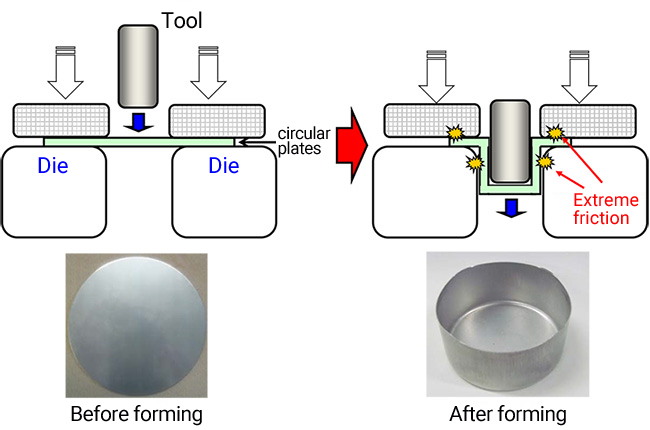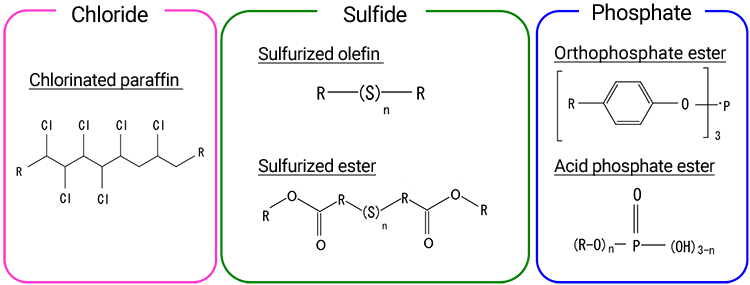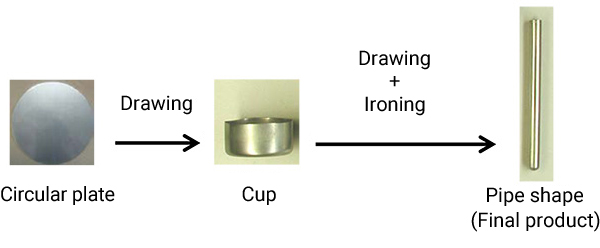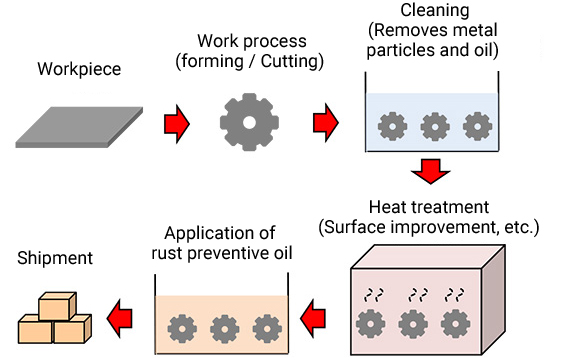RELIAPRESS
Eco-friendly forming oils
The lubricating oils used on dies, tools, and workpieces for metal forming are called forming oils. (Fig. 1). The forming oil acts to reduce friction between the die, tool, and workpiece, and to prevent galling. This requires the use of extreme pressure (EP) additives, which typically consist of organo-chlorine, sulfur, or phosphorus compounds. Forming oils were traditionally made with chlorinated EP additives such as chlorinated paraffin, which has exceptional anti-galling performance. However, certain chlorinated paraffins have been identified as potential carcinogens by the International Agency for Research on Cancer. Moreover, it has been reported that the burning of these compounds for disposal may also produce dioxins. This is fueling demand for chlorine-free oils, formulated without chlorinated EP additives. In fact, many users have switched to oils made with sulfur- and/or phosphorus-based EP additives.


Our company began offering the UNIPRESS TERAMI series of chlorine-free oils in the 1990s. We continued to make improvements to the sulfur-based EP additives and other components to develop the RELIAPRESS series, which went on sale in 2017. This series has been expanded to include a new grade of products with lower viscosities, which makes them easier to handle (Table 1). We recommend the RELIAPRESS RA and RB series for normal metal forming, and the RELIAPRESS RC series for metal forming involving severe lubricating conditions.
Table 1 - Products in the RELIAPRESS series
| Kinematic viscosity (40°C),mm2/s | Sulfur content, mass% | Difficulty of forming | ||
|---|---|---|---|---|
| RA series | RA15 | 14 | 1.9 |  |
| RA20 | 20 | 1.9 | ||
| RA30 | 31 | 1.9 | ||
| RA60 | 55 | 2.2 | ||
| RA150 | 151 | 4.1 | ||
| RA220 | 220 | 4.3 | ||
| RB series | RB50 | 50 | 11 | |
| RB90 | 90 | 11 | ||
| RC series | RC100 | 90 | 13.5 | |
| RC150 | 140 | 15 | ||
RELIAPRESS RC Series

Working stainless steel and other hard materials can involve some severe lubricating conditions. It was for conditions like these that the RELIAPRESS RC series was developed. If we're working circular plates (stainless steel) in a multi-stage deep-drawing process, a good forming oil will allow continuous forming of a larger number of pieces (Fig. 3). Using a chlorine-based oil, 10,000 pieces can be formed without stopping. With most conventional chlorine-free oils, the tools would be damaged and forming would have to stop before even 1,000 pieces were made. By contrast, RELIAPRESS RC 150 performs as well as chlorine-based oil, so tools are not damaged even after continuous formation of 10,000 pieces. Another thing is that some conventional forming oils designed for use with difficult-to-form metals had kinematic viscosities of 400 mm2/s (40°C) or higher. A kinematic viscosity this high can create problems, making application and cleaning of the oil more difficult. But by selecting the right additives, we developed an oil with a kinematic viscosity of 140 mm2/s that is much easier to work with. It also cleans off easily after use. For example, parts formed using RELIAPRESS RC 150 were cleaned with a hydrocarbon-based cleaner and then heat treated, after which no discoloration or other problems were observed (Fig. 4).


The RELIAPRESS series is suitable for all types of metal forming and is gentle to machines, the user, and the environment.